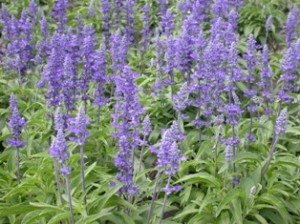Marijuana, prostitution, artillery emplacements, there are certainly plenty of things the government has deemed illegal. For many this is a good thing, as most would agree that the world could do without a cocaine cowboy with a Howitzer. However, there are still many surprising things Uncle Sam has yet to take away, such as Salvia Divinorum. Despite its potentially dangerous effects, salvia is still primarily legal in the eyes of the law. Let’s dig deeper and find out more about why this dangerous plant can be found at the local grocery store and not on the government’s banned substance list.

What is Salvia?
Belonging to the Lamiacae family, salvia is a hard-working cousin of the mint plant. The popular perennial herb is well-known for its wonderful taste and aroma, making it a regular in gourmet food magazines. Commonly known as sage, salvia has long leaf-bearing stems and tall stalks that are typically covered with wonderful flowering buds. Amazingly, there are over 800 various kinds of salvias throughout the world.
However, some only grow in extremely tropical regions and others are sparse with few leaves. With that being said, there are still dozens of different types of ornamental salvias that are popularly found in flower beds and gardens across the country.
Most types of salvia are not particularly hardy, yet some varieties can survive in climates as cold as zone four. The most common of the hardy salvia varieties is the salvia nemerosas. In 1997, a cultivar of this variety, the May Night, was given the crown of Perennial of the Year. The salvia’s vibrant purple stems overflow with violet and purple flowers each year from June through October. The May Night reaches a plant height of 18 inches, and when mature, it spreads up to 25 inches.
In addition to its use in gardens and culinary creations, salvia also has a history of being used for medicinal purposes. In fact, salvia used to be valued above tea by the Chinese who loved the plant for its healing properties. To this day, sage tea is still used to treat indigestion and sore throat. Native Americans and others have also used it for aroma therapy and cleansing rituals for thousands of years.
Salvia as a Dangerous Drug
Although it has its merits, salvia can also be a dangerous, hallucinogenic drug. When it’s properly prepared, many varieties of salvia can be smoked, resulting in incredibly intense hallucinations. The majority of salvia trips are quite jarring and powerful. However, the high does not last long as most of the side effects are gone within one hour. Since salvia is legal in most states, it does not show up in most standard drug tests.
Depending on the amount of salvia that is smoked and inhaled, users may experience vivid hallucinations similar to those experienced by those on DMT or LSD. It is this intense high, however, that keeps salvia from becoming a popular party drug and getting on the radar of America’s anti-drug proponents.
Where is Salvia Purchased?
Salvia is still legal in the majority of states. Gardeners can pick up salvia varieties at nurseries, while others can find it at smoke shops or online. However, since salvia is illegal in Florida and a handful of other states, people should check the law in their area to see if they can legally purchase and possess salvia in their state.
Why is Salvia Legal?
As far as intoxicants go, salvia is rather harmless. Of course, there have been a few cases in which the drug reportedly caused a suicidal mindset in those who smoked it, but evidence is lacking and it therefore cannot be labeled as a depressant. In fact, some scientists believe salvia may act as an anti-depressant, in addition to having already been found effective in ending cocaine addiction.
Some experts believe the drug can potentially help Alzheimer’s patients and those suffering from schizophrenia as well, and have consequently urged the government not to ban the controversial drug. As a potential cure for Alzheimer’s, depression, cocaine addictions, and schizophrenia, it’s actually surprising the drug isn’t a staple in America’s high school cafeterias.
Bottom Line
Salvia is a common plant that grows wild throughout the United States and much of the world, making it nearly impossible to ban as an illegal substance. However, due to its intense high and mind-altering abilities, it’s surprising the overlooked plant is still legal in nearly every state.
Check out our Top Online Paralegal Programs
Back to Can you Believe its Legal…?